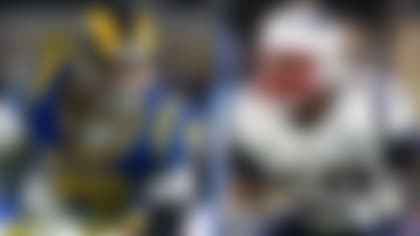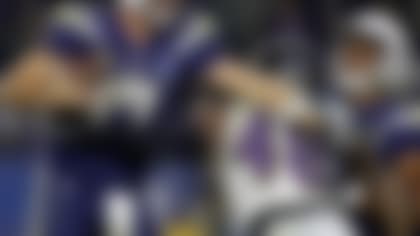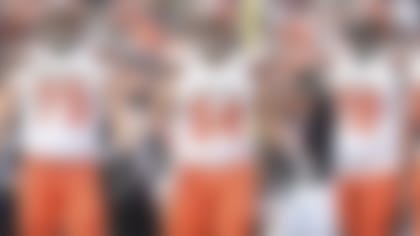It's a common saying that teams who win free agency tend to lose on the field. And yet, we spend the first days of the new league year refreshing our browsers and Twitter feeds, waiting to see which teams catch the big fishes.
There's an upside to free agency, though. While many skilled players will profit off career seasons and fail to match them with new teams, in new systems, many linemen changed teams, too. It's in these switches that we tend to see more positive outcomes -- and more often on the interior than anywhere else.
Let's take a look at some of the teams who made big moves with big guys.
Cleveland Browns
In one offseason, the Browns went from having a top-10 offensive line to a bottom-five unit. It's a near miracle that Isaiah Crowell still managed to come just 48 yards shy of 1,000 on the season running behind a patchwork group that included Cameron Erving (notably awful until the final third of the season), Austin Pasztor, Alvin Baile, Spencer Drango and Shon Coleman. The bright spots were future Hall of Fame tackle Joe Thomas and standout guard Joel Bitonio, with the latter only appearing in five games due to injury. In short, the Browns needed upgrades.
And upgrade they did.
Within the first 24 hours of free agency, Cleveland signed the top guard on the market in former Bengal Kevin Zeitler and the second-best center on the market in former Packer JC Tretter. Ranked seventh in NFL.com's Top 101 free agents, Zeitler is an instant and massive upgrade over the variety of guards Cleveland trotted out, including veteran John Greco. Zeitler's addition is also the second time Cleveland has robbed division-rival Cincinnati of its best lineman, doing the same with the signing of guard Eric Steinbach in 2007. That signing, a weak schedule and an aberration of a year from Derek Anderson resulted in a 10-6 season for the Browns. That probably won't happen in 2017, but it's indicative of how much of an immediate difference a top-flight lineman can make.
Tretter solidifies a position that became incredibly unstable following the departure of Alex Mack, and mercifully eliminates a reliance on Erving, who demonstrated a serious lack of upper body strength and was a disaster until he got things together late in the year. Cleveland can kick Erving back out to tackle along the right side, as he has experience playing tackle from his days at Florida State.
More importantly, the interior makeover leaves Cleveland with one of the league's best first-four linemen (Thomas, Bitonio, Tretter, Zeitler), right up there with the likes of Dallas (Tyron Smith, La'el Collins, Travis Frederick, Zack Martin), at least on paper. Each has a question at right tackle to answer, and how Cleveland jells will be a separate tale to monitor. But as the sexier signings at skill positions get more attention, Cleveland is doing it the right way for once -- the Browns also extended Bitonio for five years on the same day -- building from the inside out.
Minnesota Vikings
Minnesota was right up there with Cleveland in the battle for worst offensive line in the NFL. Well-equipped defensively and at most skilled positions, the Vikings suffered tremendously from a line that functioned more like a sieve than a snow fence. Adrian Peterson had nowhere to run, and his replacements didn't fare much better. Sam Bradford was pressured early and often in most contests, leaving Minnesota's offense hamstrung and a safe bet that each week would bring a low-scoring, grind-it-out affair. The offseason exodus told a story of a front office that wasn't fond of its linemen; only guard Alex Boone and center Joe Berger remained from the starting five.
Feeling the contention window beginning to exhibit the effects of gravity, general manager Rick Spielman hit the open market for a pair of retreads. The Vikings signed tackles Riley Reiff and Mike Remmers to round out two positions that were victimized by edge rushers for much of 2016. Remmers too was memorably made to look like a fool -- as Chris Wesseling likes to say, put in a clown suit -- in Super Bowl 50 against Von Miller and the Denver Broncos, though he rebounded to have a decent season in Carolina. It wasn't decent enough to convince Dave Gettleman to retain him, instead adding former Viking Matt Kalil in Remmers' place in a weird swap of average tackles. But he's an upgrade over both T.J. Clemmings and Andre Smith.
The same goes for Reiff, the better signing of the two, who will man the left tackle position. Reiff's departure came as Detroit filled his position with Ricky Wagner, but that shouldn't be alarming for Minnesota. This is again an upgrade, because the bar was low with Clemmings and Smith, and Reiff (ranked 19th in NFL.com's top 101 free agents) is largely dependable. As Gregg Rosenthal wrote, most tackle signings in this class shouldn't be all that inspiring -- but it's better than what they had.
Detroit Lions
Detroit's line had a decent pair of tackles in Reiff and rookie Taylor Decker, but the Lions wasted no time in shopping for upgrades. They found one in guard T.J. Lang, a former Packer who was ranked 14th in the top 101 free agents list and immediately replaces the departed Larry Warford, and a very slight downgrade in tackle Ricky Wagner. While Riley Reiff hits the bricks for Minnesota, Wagner (ranked just eight spots behind Reiff in the top 101) arrives with some sterling tape from the second half of the 2016 season. He'll occupy the right tackle position, giving Detroit bookend tackles with Wagner and second-year pro Taylor Decker.
With Lang, Graham Glasgow and Laken Tomlinson, Detroit suddenly has depth at guard. It lost a little at tackle but gained plenty at guard. With Decker installed at left tackle for what could be the next decade, I'm sure Lions fans will take the trade-off.
Seattle Seahawks
Seattle sent out one of the youngest, most inexperienced offensive lines in the NFL last season, and it showed. The unit lacked continuity and rarely was anything but average at best. Russell Wilson was forced to use his legs more than even he'd probably like, and general manager John Schneider didn't ignore it in the offseason.
With former Seahawk Russell Okung available after a disappointing stint in Denver, Seattle instead elected to add veteran tackle and former No. 2 overall pick Luke Joeckel. Veteran is a generous adjective here, though, as Joeckel has only been in the league for four seasons, all spent with Jacksonville. He wasn't anywhere near what the Jaguars thought they were getting in a top-five pick (though most of the 2013 class proved to be disastrous), and hopes to fare better in Seattle on a line that has listed ages of 25, 24, 25, 22 and 26. If that unit ever grows from green to good, watch out. But until then, Seattle can only hope the new addition provides a small boost at the very least.











